- Home
- Madeleine Roux
Tomb of Ancients Page 7
Tomb of Ancients Read online
Page 7
“Peace,” I said softly, feeling the uncomfortable, fitful beginnings of a headache, one that I could easily attribute to Father. He relished this discontent, no doubt wishing I would tear Dalton to shreds then and there for his heritage. “Let us not argue. We will do what we can to help Mother and decide how to proceed when Wings returns.”
But Dalton noticed me pinching and massaging my forehead. I had not made an attempt to hide my agitation.
“Are you well?” he asked.
“For now. The sooner we are away from those chanters, the better. I do not trust myself—Father—around them.”
I had said nothing to anyone about Father’s rising desire for blood, yet Dalton watched me closely. Studied me. I tried to give him a consoling smile, but even I knew it was thin and unconvincing. Any moment of peril might unleash Father again, and I said a silent prayer to whoever was listening that the afternoon would go forward smoothly.
The carriage rolled to a stop. Fathom went first, inspecting the alleyway for anything suspicious, but there was nothing. We paid the driver and ducked one by one under a low canvas awning. The streets ran with sludgy water, the scent of worms and urine making my stomach turn. Above us, the dome of the Observatory shimmered, slick and green as a washed onion. Dalton led us down a long, narrow passage of black stones, away from the Observatory, and into a kind of indoor market. The stalls were largely empty, wisped in cobwebs, caught raindrops winking in the light of lanterns. Gradually, the stalls became utterly decrepit, then off-puttingly so. It occurred to me that nobody would willingly walk this far down into the market, fearing ambush from thieves or worse.
At last we reached an unremarkable door, its knob dingy and rusted. The distinct chatter of mice could be heard through the walls.
“Charming,” I heard Khent mutter under his breath.
“A little patience, please,” Dalton replied.
The inside of Cadwallader’s could not have been more different from the outside. It gleamed with row upon row of glass cases. Though a pleasant dustiness hung on the air, I could see not a speck of grime anywhere in the place. The carpets were comfortably trodden, patterned in ochre paisley. Black wood floors and oak paneling on the walls gave the place a cozy, secluded feel, like a grandmother’s tearoom. Only here there was no tea, just books, of all shapes, sizes, and origins. Paper lanterns constructed from book pages blazed above us, strings of little paper shapes strung wall to wall like bunting.
“I could live here,” I breathed, standing on the carpets and turning a slow circle. A staircase on either side of the wide room led up to a second floor, though I also glimpsed a passage up to a third.
“Out of curiosity,” Dalton said, standing beside me with his hands in his pockets, “what exactly did Henry want you to do here?”
“Deliver this note,” I said, taking the parchment out from under my cloak. “He wanted to know how Bennu’s journal came to be here.”
Dalton burst into laughter, adjusting the scrap of fabric over his eyes before it could fall. He had pushed back his hood, but it would have tumbled off his head from his sudden laughter. “No need. I brought it here. I figured it would wind up in Henry’s library eventually.”
“Did you want him to have it?”
“I did, yes.” He shrugged. “But I had no desire to deliver it in person, and besides, he’s horrible at accepting gifts. No, I knew that if his contacts stumbled upon a promising artifact, he would feel much cleverer and take it more seriously.”
I gawked at him while the others began to explore the shop. “But how did you come to have it in the first place?”
“I went there, to the First City, looking for a way to make our past misdeeds right. What I found was the journal of a dead man.” Here he lowered his voice, waiting until Khent drifted out of hearing range. “There was something about it, something strange, and I pried it from his skeletal arms because I knew in my soul it was the key. Poor sod. I’d been hunting the fellow for ages, but never managed to find him because of a damn translation error. I was told to find Bennu the Writer, not Bennu the Runner. Bloody embarrassing.”
Dalton vented a laugh, but I didn’t find it funny. “When I took it, one of his bones snapped. It was like a twig breaking in a graveyard, raising the dead. Things there began to wake up, the Dark Father began to wake up, and I fled. I brought the journal where I knew Henry could find it, one last favor, one last olive branch, and then I told myself that I was done. Out. No more. I would find a quiet place to hide and let the ages chip away at me until nothing but regret and memory remained.”
“And how did that work out for you?” I sighed.
“Henry . . . My feelings for him have a way of bringing me back in.” He sounded decidedly not thrilled about that bit. “One day I’ll untie this invisible string from my finger, but apparently today is not that day. I can’t face him alone, but I can help you. That’s my olive branch this time.”
I nodded, trying to take in all that he was saying and align it with what I knew from Khent and Mary. “The shepherd wanted to know where the book was. Our book. The book of the Dark Fae. But Father consumed it, so there was no way to really find it, was there?” I drifted deeper into the shop, overwhelmed by all there was to look at. A counter manned by a single person lay at the opposite end from the door.
“I had no way to translate that journal,” Dalton explained. “But I had a feeling Henry would crack it. Anyway, if it really did hold the secret to where your book was hidden, I didn’t want the shepherd to get his hands on it.”
“But Henry you trust,” I murmured.
“Yes.” He sighed. “Occasionally. Well, no. But he has his moments.”
I looked at the folded parchment in my hand. Some of the charcoal from my notes had rubbed off onto my palm, and I wiped it off on my frock. “So it’s pointless to deliver this. But what do I tell Mr. Morningside, should our paths cross again?”
“Tell him the truth,” Dalton said with a wry smile. “I only hope I’m there to see it. Ah! There’s Niles.”
“One man looks after all these books?” I asked. Mary and Khent had found a corner with a selection of novels, and Mary was reading him the titles, helping him with his English. Mother had been set in her cage on top of one of the stacks.
“Not always, but it looks rather slow today,” Dalton said. “Everyone here is knowledgeable on the subject in question. There’s a reason Henry relies on them to set aside anything dangerous or arcane that drops into their shop.”
“And just anyone can come in here?”
“Certainly. Why not? They only go out of their way to discourage . . . hobbyists. One has to possess a certain passion for the occult and unexplained to land here. You saw that alleyway, not many ladies stopping in for a copy of Castle Rackrent.”
“Had I stumbled upon this place, I should never leave it,” I said.
“Indeed,” he said. “I share your fondness.”
Fathom waited for us at the counter, leaning against it as if she were a regular. She had roused the one shopkeeper from his work, and he looked to us with enormous spectacles perched on his forehead. I had expected the man to introduce himself as Cadwallader, the owner, however there was something annoyingly familiar about his face.
“Niles! How are you? How’s business?” Dalton clapped him on the shoulder, rattling the skinny older man.
“Hmph. Fine. Slow but steady. Who is this?” He collected his spectacles, observing me with eyes blown wide and blurry by the glass.
“May I present Louisa Ditton? She was until recently employed by Mr. Morningside at Coldthistle House.”
The mention of Henry or the house adjusted the man’s attitude toward me at once. He melted into a fawning smile, bowing so low he nearly hit his head on the countertop.
“What a delight,” he said. “Simply a delight. Niles St. Giles, but please, no formalities here.”
I snorted softly, my cheeks going red. “Niles St. Giles? No relation to Giles St. Giles of De
rridon?”
His eyes grew bigger, if that were possible.
“Giles would be my brother, having chosen the noble profession of embalming and . . . whatnot.” The whatnot, of course, referring to his predilection for helping Mr. Morningside do away with the souls and bodies of those that met their end at Coldthistle. “But of course it would make perfect sense that you two would be acquainted, sharing such a singular employer.”
“What a very charitable description,” I muttered.
“How is he—my brother? How is his cat?”
I smiled at the now-distant memory of sitting in Giles’s salon, only just having escaped death at the hands of a mad doctor. Mary had spoken so fondly of his cat, and I had watched it laze like a giant furry lump by the hearth.
“Francis is well, last I saw him, but off the biscuits, apparently.”
“Yes, Giles did have a dreadful habit of overfeeding his pets. A lesser sin, I think,” Niles said with a hearty laugh. Now that I was looking for the comparison, I realized that he and Giles were all but twins—tall, lanky, and birdlike—with arms so narrow a stiff breeze could make them snap. “Now then, what brings you illustrious folk to my shop this afternoon?”
Dalton looked charmed by the man’s effusion, though Fathom rolled her eyes liberally. I couldn’t help feeling an immediate kinship with the man—any connection, any touch of familiarity in this rapidly darkening world, felt like a beacon in the shadows. Dalton mimicked Fathom’s relaxed pose, leaning an elbow onto the case, which housed books so old they might have exploded into fine powder at the lightest touch.
“Given the clientele that moves through here, we thought you or Cadwallader may know of someone useful. A shadow binder, or someone with similar skills. We seem to have stumbled upon a powerful curse, one that we cannot lift ourselves.”
Niles took this in as if he were simply hearing the latest dispatches from the Peninsular War. Grimacing, he nodded along to every single word, adjusting his spectacles with quick little fidgets. I put the letter that had been meant for the proprietor on the countertop, showing him the notes I had taken.
“Mmhm, mmhmm. Yes, very interesting. Fascinating. In fact, I know just the sort. Are you familiar with the Birch and Fox? The barkeep there is of boundless talent. Coaxed a nymph from a tree in Kensington Gardens not three weeks ago.”
Niles beamed at us, pleased and clever, but Dalton shook his head, his brow furrowing over his bandaged eyes.
“We cannot make the journey, friend. The streets are rife with enemies. If time were not so short, I would explain better,” he said. Then he nodded toward Fathom. “Could this barkeep be summoned? Fathom is less known to the Upworlders, and one woman on horseback is light and fast.”
She pulled up the hood of her coat, already determined.
“Tell me what to look for,” she said, sliding the parchment into her coat.
“Indeed, indeed,” Niles chirped, disappearing below the counter to search through unseen shelves there. “I will make the arrangements. A curse lifted in Cadwallader’s! How exciting. How simply marvelous.”
Chapter Nine
1248, Constantinople
I had forgotten the hard, slicing winds of sand that sweep through the city in high summer. Where I was born was a temperate place, never too hot or too cold, and my whole self is melting in the relentless humidity. But Henry loves it. He loves everything, I think, or he masks his indifference with boundless enthusiasm so indistinguishable from the real thing that one is forced to believe it.
He is half-insane with a new obsession. The book Ara lugs around (she calls it the Black Elbion, which I’m sure is meant to offend me, but I refuse to be baited) is all Henry can talk about now. I hear him whispering about it in his sleep. She claims it came from the depths of the ocean, that its powers cannot be studied or understood. While they slept last night, I tried to read it, but the cover burned my fingers and the marks refuse to fade. Ara has not yet noticed the bandages, but she is sure to interrogate me once she does.
This fixation of Henry’s is how we find ourselves in Constantinople. I would love this place were it not so unbearably hot. Ara makes us cover our faces with flimsy black shawls that wrap around our heads and pin to our tunics. She tells us that it will be easier to ask questions if we are concealed this way, dressed like the other citizens, our belts heavy with beads and metal, our eyes the only indication of our moods. We sipped a strong, sharp tea in the shade of the Ayasofya, and I could take only one or two sips of the stuff. How anyone could stand to drink something scalding hot on an already arid day is beyond me. No, I ignored my tea, looking instead at Henry, looking at him while he gazed at the splendor above us.
I think the best way to love something is through another person’s eyes. He sees things I cannot, loves things with so much of his heart that I feel the echo of that passion and pain in my own. I know Ara caught me staring, and I weathered her sniggers with an air of humor I did not feel. Henry may adore this city, but I am a stranger here, and I feel the stirrings of ancient, unknown gods that frighten me. I long to be with my brother and sister and miss them constantly, and I am left to lie awake at night dreading what they will say when I return. Sparrow begged me not to leave, but I had an excuse, of course. The mission. This mysterious writer must be found, and the rumors of his comings and goings were so erratic that even this detour could be forgiven. Which brings me back to the books.
The books. There are more of them now, more than just ours and the thing hiding in Ara’s pack. While the two of them sipped their tea, Ara berated Henry for leading us on this fool’s errand.
“How many times must I tell you,” she snapped at him. “The books appear when they wish to. Pluck this idea out of our head, Henry. There will be no answers at the end of your search.”
She spoke with such authority. I noticed it, and naturally Henry did, too. He stared at her for a long moment, his eyes reflecting the water-bright tiles beside us, steam rising steadily from his cup. “How do you know? How can you be so certain?”
Ara tugged at her sleeves nervously then, and I could not help noticing the markings on her arms. She was not a very old woman, but something had aged her so severely that deep lines were already carved into her forehead and chin, wisps of gray spreading through her dark hair. Yet she was a handsome woman, regal in her gathered linens the color of wheat.
“I only want to protect you from disappointment,” she said, distant. “There are secrets in this world long buried and best forgotten.”
She reached across the table with one sun-leathered hand and touched Henry’s wrist. I looked away, embarrassed by the motherly gesture and feeling as if I were trespassing on a moment in which I did not belong.
Then Henry yanked his hand away, marveling up at the masterpiece that shaded us, the temple rising so tall we could not see its end point.
“Nothing will keep me from speaking to this Faraday person. I’ve already arranged the meeting, and besides, it’s only a few questions. What’s the harm in that?”
Ara had no time to answer, for Henry’s pack had spilled over, a wriggling bundle of fur tumbling out onto the dusty stones of the road. He squealed with delight and picked up the pup, settling it in his lap with a fond little pat.
“I cannot believe you insisted on bringing that thing,” Ara muttered, pulling her sleeves again.
“That thing is vital for any adventurer,” Henry replied with a sneer, holding up the brownish ball of fur and kissing it on its black nose. It pawed at his chin and made playful growls. “For what is a man without his dog? Anyway, this sweet fellow can sense a man’s true emotions. He will be of utmost importance this evening.”
“What nonsense,” I said, echoing Ara’s displeasure. It was perhaps the one thing we agreed upon. I had always favored cats. Until this venture I had known Henry only to keep birds, but apparently his interests had blossomed.
“Tell me, Bartholomew, is Spicer pointlessly cross with me right now?”
&nb
sp; The puppy gave a high, tiny howl, paddling air.
Henry shrieked with laughter, hugging the thing to his chest. “You see? He’s perfect.”
As are you, I thought, when you aren’t unbearable.
“Bah. It’s going to get huge,” I murmured, crossing my arms over my chest and baking in the heat. “I won’t be cleaning up after it.”
“Not for centuries,” Henry corrected, his knowledge of all things magicked and Fae unchallenged. Well, perhaps challenged only by Ara. “He will fit in my pack for years and years to come, and then I shall find some place for him to grow. Now, finish your tea, I want to explore the temple before dark.”
Thunder shook Cadwallader’s to its foundation as afternoon turned to dusk. Rain lashed the outer walls of the shop, though without windows it was nearly impossible to tell time in that place, the steadiness of the candles and lanterns never rising above a gentle glow. As the hours disappeared, so, too, did my patience. I couldn’t help thinking that our time would be better spent on the road, leaving behind London and its perils. But Cadwallader’s lay between Deptford and Dalton’s man with the horses, offering us a chance to bring Mother along on the road and with her, greater defenses.
And when I glanced at the spider, Mab, in her cage, I remembered that there was more at stake than just what was trapped inside me. If this was the faster option, then she deserved to be freed at once.
The door to the shop crashed inward just as I was turning a page in Dalton’s diary. I had found a secluded nook and tucked up with it while Khent prowled near the entrance and Mary chatted with Niles. All of us jumped to our feet as Fathom returned, a strange wind blowing in with her, ruffling pages and rattling shelves. Dalton had sent Fathom out on the errand, as one lone human navigating the city would be less noticeable. A salty, muddy smell filled the shop, a scent I knew well, a warning from the clouds that a vicious storm was on the move.
Candles flickered and faltered as a cloaked figure bustled in, a parcel held to her chest. I closed up the diary and joined the others, hurrying down the staircase to the counter. We gathered there, waiting for Fathom and the stranger to approach. I could see only the hands clutching the parcel, and they were white as bone.

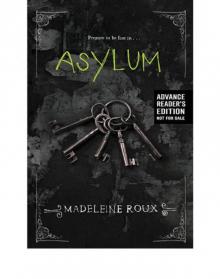 Asylum
Asylum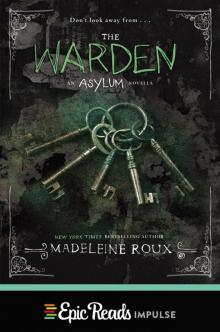 The Warden
The Warden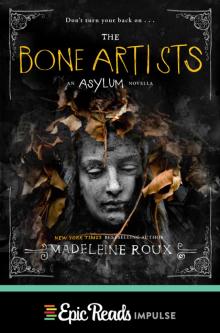 The Bone Artists
The Bone Artists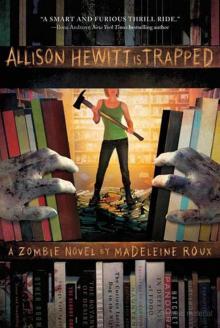 Allison Hewitt Is Trapped
Allison Hewitt Is Trapped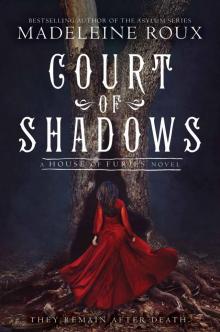 Court of Shadows
Court of Shadows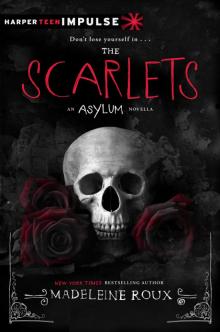 The Scarlets
The Scarlets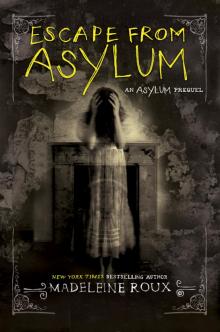 Escape From Asylum
Escape From Asylum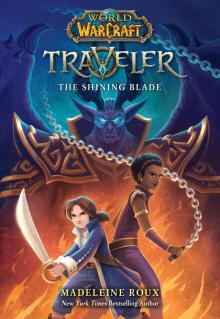 The Shining Blade
The Shining Blade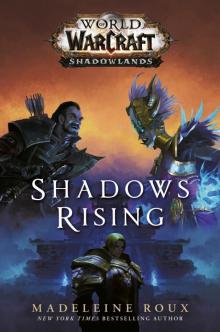 Shadows Rising (World of Warcraft: Shadowlands)
Shadows Rising (World of Warcraft: Shadowlands)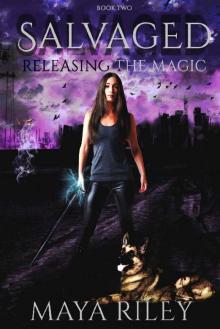 Salvaged
Salvaged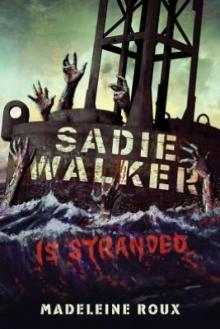 Sadie Walker Is Stranded
Sadie Walker Is Stranded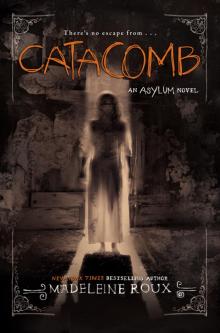 Catacomb
Catacomb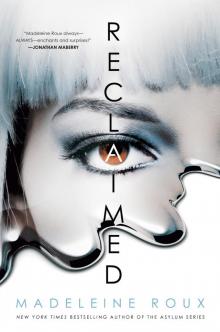 Reclaimed
Reclaimed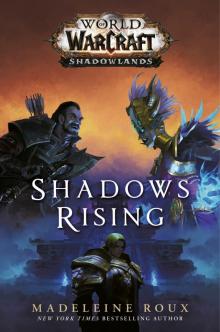 Shadows Rising (World of Warcraft
Shadows Rising (World of Warcraft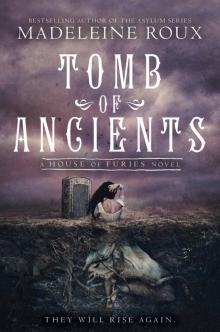 Tomb of Ancients
Tomb of Ancients